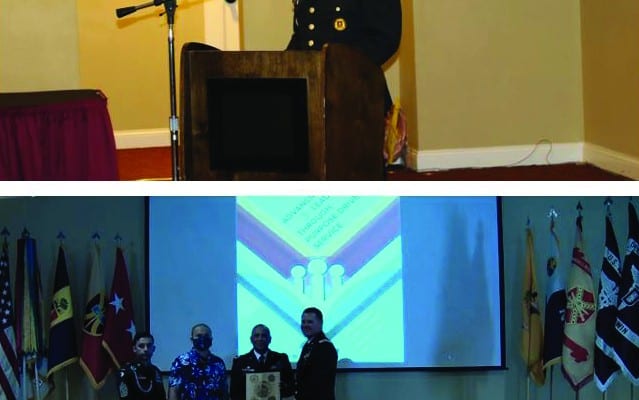FORT IRWIN, Calif. — The National Training Center and Fort Irwin observed Asian American and Pacific Islander month on May 26 with a theme of, “Advancing leaders through purpose-driven service.”
Each May, the Department of Defense pays tribute to the generations of Asian American and Pacific Islanders who have enriched the nation’s history and continue to be pivotal its success.
This year’s observance came at a time when hate crimes against Asian Americans have seen a significant climb.
Guest speaker, Maj. Gen. (ret.) Eldon Regua referenced reports that over the last year, there have been 6,600 reported anti-Asian American crimes and incidents.
“Stop AAPI Hate, an advocacy group tracking hate incidents, said it had received nearly 3,800 reports of hate incidents since March 2020, compared with roughly 100 incidents in previous years,” Regua said as he mentioned those cases have terrified the Asian American community.
He praised the COVID-19 Hate Crime bill that has been signed in congress that encourages more training on hate crimes for law enforcement, establishes hate crimes hotlines and allows for rehabilitation efforts for the perpetrators of hate crimes.
The DoD celebrates the month of May as AAPI month in order to honor the generations of Asian Americans and Pacific Islanders, and native Hawaiians who continue to serve proudly and selflessly in defense of the nation.
The observance was signed into law in 1978, and commemorates the arrival of the first Japanese immigrants to the U.S. on May 7, 1843.
The AAPI community includes all Americans who trace their ancestry back to the Asian continent and the many Pacific Islands of Melanesia, Micronesia and Polynesia.
AAPIs have served in nearly every, armed conflict since the founding of the U.S and almost 60,000 Army soldiers who identify as Asian American and Pacific Islander serve in the total force today.
30,000 Japanese Americans enlisted in World War II and the 100th Infantry battalion and 442nd Regimental Combat team remains the most decorated unit in U.S. military history.
Ultimately, the outstanding performance of segregated minority units, like the Tuskegee Airmen, the Native American Code Talkers and the famed NISEI warriors/soldiers led the Department of Defense to review its policies on minorities serving in the military and subsequent integration of the military.
Regua is Filipino American and said his culture continues to be underrepresented in the officer ranks of all services but said leaders are working to get balance.
“I know the quality is out there but it’s going to take time,” he said. “We need to keep at it, though.”
The event was held at the Sandy Basin Community Center and also live streamed on Facebook.com/NTCfortirwin.
It was hosted by the NTC MEO/EEO offices, along with the 2916th Aviation Brigade.
“AAPI month stands as a reminder for the strength the Army has gained and will gain through a high quality, diverse, all-volunteer force,” Regua said. “Diversity makes the Army better and more equipped to meet the challenges and threats of the future. Individuals of AAPI decent serve the Army with great value and distinction and continue to be critical members of the Army team.”












